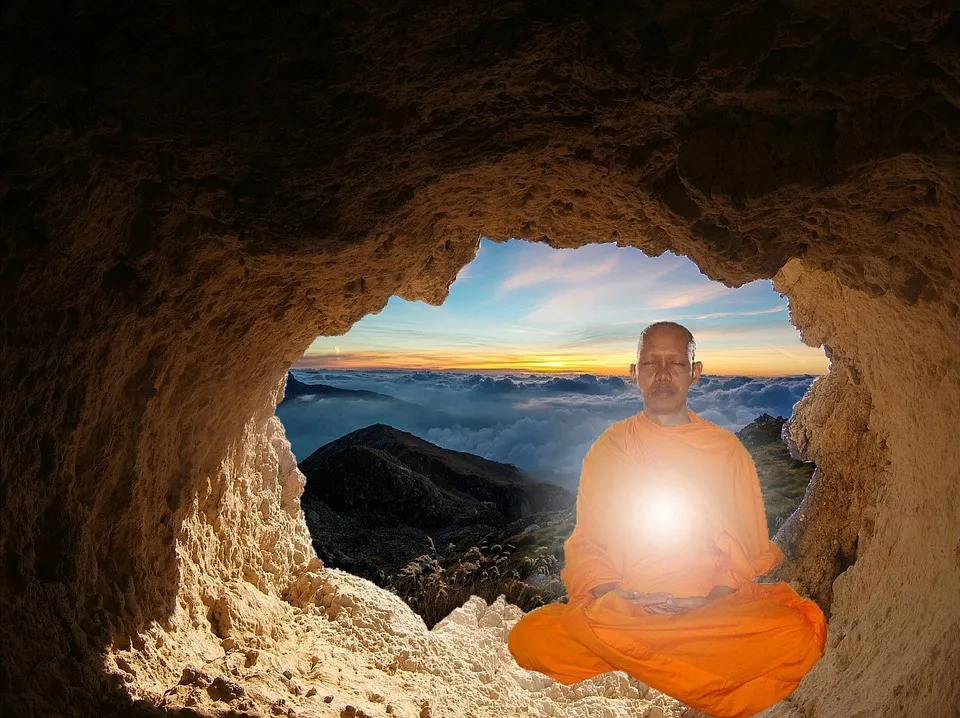Have you ever felt like something was missing in your spiritual life? Perhaps you have been feeling disconnected or unfulfilled in your faith. Spiritual blindness can occur to anyone at any stage in their journey. If you resonate with this, then keep reading to explore the symptoms, causes, and actions you can take to overcome spiritual blindness, and ultimately reach the path towards spiritual enlightenment.
Understanding Spiritual Blindness

If you are reading this article, chances are that you are on a journey to understanding spirituality, or you may know someone in your life who is. As a youth pastor, I often encounter people who feel spiritually lost or disconnected, and one of the biggest hurdles that prevent them from achieving faith and enlightenment is spiritual blindness.
Spiritual blindness can be defined as a condition where an individual is unable to perceive the spiritual realm. It is a state of mind where a person is not aware of the higher consciousness, the divine guidance, and the essence of life that lies beyond our visible reality. It is the inability to recognize the presence of God or the divine power that governs our lives.

Symptoms of Spiritual Blindness
People who suffer from spiritual blindness often exhibit certain characteristics that are noticeable. These include being critical, judgmental, and argumentative about religion and faith-related topics. They might also lack empathy, mindfulness, and a sense of inner identity.
Causes of Spiritual Blindness
Spiritual blindness can stem from different reasons. Some people might experience it because of their life experiences or personal beliefs. It can also arise from a lack of exposure to diverse perspectives, limited personal development, or the ego’s dominant influence.
Overcoming Spiritual Blindness
Overcoming spiritual blindness requires a deep level of introspection, self-discovery, and inner growth. It involves exploring and questioning one’s beliefs, assumptions, and preconceptions. One can also overcome spiritual blindness by practicing mindfulness, meditation, and self-reflection to gain insight, awareness, and a heightened sense of perception.
The Path to Spiritual Enlightenment
Spiritual enlightenment is the process of transcending spiritual blindness and attaining higher consciousness. It is a journey of self-discovery, awareness, and insightfulness that involves learning to listen to one’s intuition and seeking the truth within oneself. To achieve spiritual enlightenment, one might be required to let go of their belief system, embrace spiritual practices, and embrace the unknown.
Living with Spiritual Awareness
Living with spiritual awareness requires constantly striving to maintain a deep level of mindfulness and introspection. It also calls for embracing the essence of spirituality and being conscious of the higher power that governs our lives. By doing so, one can experience personal growth, connectedness, inner peace, and a greater sense of purpose.

In conclusion, if you want to embark on a journey of spirituality and enlightenment, it’s essential to understand what spiritual blindness is and how it manifests. Overcoming spiritual blindness requires a willingness to let go of old beliefs, embrace new perspectives, and embark on a path of self-discovery. As you begin this journey, remember to approach your spiritual growth with an open heart and an open mind, and embrace the transformative power that accompanies it.
Symptoms of Spiritual Blindness
It is often challenging to recognize spiritual blindness in oneself, but observing symptoms can be helpful. Generally, people with spiritual blindness may exhibit some of the following characteristics:
-
Lack of Awareness: One of the most common signs of spiritual blindness is the lack of awareness of things happening around oneself. People to whom this happens may find themselves in a state of numbness and may not notice even something significant happening around them.
-
Egoistic Behaviour: Ego is often the biggest barrier to spiritual awakening. People who have their egos bolstered to an extreme level often have difficulty accepting or even acknowledging a higher power or consciousness.
-
Resistance to Change: Resistance to change is a natural human tendency, but those who are spiritually blind might have an unhealthy attachment to their current belief system or way of thinking. They may resist or neglect ideas that could lead them onto the path of self-discovery or inner growth.
-
Lack of Curiosity: People who are spiritually blind often lack a curious and questioning mind. They may not seek insights or search for the deeper meaning behind any situation. They may generally walk past life without thinking much.
-
Absence of Inner Peace: People who are spiritually blind may feel a sense of restlessness, anxiety, or a general lack of inner peace. They might often feel troubled and apprehensive about the future.
On the surface, these symptoms may seem subtle, but they collectively contribute to a life far removed from the awareness and insight that comes with being spiritually enlightened. Understanding these symptoms can help people recognize spiritual blindness in themselves or their community and seek ways to overcome it.
Causes of Spiritual Blindness
Spiritual blindness can be caused by various factors, including:
-
Lack of Awareness
Many people go through life without taking the time to truly introspect and understand themselves. They may be focused on external measures of success, such as wealth or status, and don’t realize there is more to life than material possessions. This lack of awareness can lead to a spiritual disconnect and ultimately, spiritual blindness. -
Ego
The ego can be a powerful force and create a barrier between individuals and their spirituality. When the ego is in control, it can cause people to prioritize their own needs and desires above everything else, leading to spiritual blindness. -
Attachment to Material Possessions
In today’s world, it’s easy to get caught up in the pursuit of material possessions. Unfortunately, this focus can lead to attachment and dependence, causing people to lose sight of their true selves and spiritual needs. -
Closed-Mindedness
Many people have preconceived notions of what spirituality and religion should entail and are not open to exploring other ideas or perspectives. This closed-mindedness can lead to spiritual blindness since they are not willing to consider alternative ways of thinking and being. -
Limited Understanding of Belief Systems
For some, a limited understanding of belief systems can lead to spiritual blindness. If they are not exposed to various religious and spiritual concepts at an early age or throughout their life, they may lack the knowledge and awareness to fully grasp the depth and breadth of spiritual experiences.
It’s important to note that spiritual blindness can also stem from personal experiences, such as trauma or loss. However, regardless of the cause, it’s crucial to be aware of the signs and work towards overcoming it.
« Exploring the Significance of the Tent of Meeting in the Bible
Understanding the Judgment Seat of Christ: A Biblical Perspective »
If you find yourself struggling with spiritual blindness, know that it’s possible to overcome it. By recognizing the causes and working towards self-awareness and understanding, you can open yourself up to spiritual enlightenment. This journey may involve practices such as meditation, self-reflection, or seeking guidance from a trusted spiritual source.
Overcoming Spiritual Blindness
If you’re reading this article, chances are you’re trying to understand what spiritual blindness is and how to overcome it. Spiritual blindness is a state of mind where an individual cannot see beyond their current perception of reality. It’s an inability to perceive and process spiritual information due to various factors such as ignorance, lack of awareness, or even negative beliefs.
But the good news is that spiritual blindness isn’t something that’s permanent. It’s a state that one can overcome through various means. Here are some of the ways you can overcome spiritual blindness:
-
Seek spiritual guidance: It’s crucial to seek spiritual guidance from someone who’s more spiritually advanced than you are. A spiritual mentor or guide can help you understand the spiritual path and guide you through the various challenges that come with it.
-
Practice mindfulness: Mindfulness helps us to stay present and focused in the moment. It’s an excellent way to overcome spiritual blindness because it helps us stay open to the unknown and the unseen. Engage in mindfulness practices such as meditation, deep breathing, or yoga to stay present and in tune with your surroundings.
-
Embrace spiritual practices: Embracing spiritual practices such as prayer, fasting, charity, and reading the Bible can help you create meaning and purpose in your life. These practices help us cultivate a relationship with a higher power and learn more about our faith.
-
Question your belief system: It’s essential to question your belief system and examine the source of your beliefs. Are they serving you, or are they hindering your growth? Allow yourself to be open to new perspectives and ideas that may challenge your beliefs.
-
Connect with nature: Nature has a powerful way of connecting us to the divine. Take a walk in the park, go to the beach, or simply spend time in your backyard. Connect with the beauty and wonder of the natural world and see how it opens up your spiritual awareness.
Conclusion
Overcoming spiritual blindness is a journey that takes time and effort. But with diligence and perseverance, you can reach a state of spiritual enlightenment where you have a deeper understanding of your faith and purpose. Remember to seek guidance, practice mindfulness, embrace spiritual practices, question your beliefs, and connect with nature. These steps will help you overcome spiritual blindness and allow you to live a more mindful and fulfilling life.

The Path to Spiritual Enlightenment
Are you feeling lost? Do you feel like something is missing from your life? Are you seeking something deeper than just material possessions? The path to spiritual enlightenment may be exactly what you need.
Spiritual enlightenment is not just a coveted state of being, but it is a journey of self-discovery and growth. However, this path is not for the faint-hearted. It requires a willingness to let go of the ego and to become fully present with oneself. Here are some steps to help you on your journey to spiritual enlightenment:
-
Start with Introspection: Take some time for yourself and reflect on your life. Ask yourself, “Who am I?” “What is my purpose?” and “What brings me joy?” Looking within yourself can lead to profound self-discovery.
-
Seek Higher Consciousness: By practicing mindfulness and meditation, you can tune out the distractions of the outside world and become more present and aware of your surroundings. This higher level of consciousness can lead to a deeper understanding of yourself and the world around you.
-
Let Go of Limiting Beliefs: Our belief systems can sometimes keep us from reaching our fullest potential. Be open to the possibility that there is more to life than what you have been taught. Allow room for new beliefs and experiences to enter your life.
-
Embrace Your Inner Self: Embrace who you truly are, flaws and all. Accept yourself and show yourself the love and compassion you deserve. The more you love and accept yourself, the more love and compassion you will have for others.
-
Serve Others: Helping others can give you a sense of purpose and connection to something greater than yourself. By putting others before yourself, you can experience a deeper level of fulfillment and joy.
Enlightenment is not a destination, but a journey. It requires patience, commitment, and dedication. While the journey may be difficult at times, the rewards are immeasurable. As you walk the path to spiritual enlightenment, remember to trust the process and stay present in the moment.
In conclusion, the path to spiritual enlightenment is an opportunity to discover your true self and live a life of purpose and fulfillment. By following these steps, you can begin the journey to a higher level of consciousness and awareness.
Living with Spiritual Awareness

Living with spiritual awareness is the goal of anyone seeking to find meaning and purpose in life beyond the superficial aspects of everyday existence. It involves tapping into a higher level of consciousness, one that allows you to recognize your interconnection with all living things and understand the interconnectedness of the universe.
To achieve this heightened state of awareness, it is essential to adopt certain practices. These may include mindfulness meditation, prayer, yoga, or other spiritual practices that promote introspection and self-reflection.
One of the most effective ways to cultivate spiritual awareness is through regular meditation practice. By quieting the mind and focusing on the present moment, you can train yourself to become more attuned to your inner voice and intuition. As you become more aware of your thoughts and feelings, you’ll begin to notice patterns and deeper meanings that can help you better understand yourself and the world around you.
Another important component of spiritual awareness is the ability to recognize and release negative emotions. When you are in touch with your spiritual side, you are better equipped to handle life’s ups and downs without getting lost in anger, envy, or other negative emotions. You can learn to observe them without reacting to them, thereby developing a more balanced and compassionate perspective.
Living with spiritual awareness also means living in alignment with your values and beliefs. This requires a willingness to examine your core beliefs and attitudes about yourself and the world. By examining these beliefs, you can identify those that are limiting and replace them with more empowering beliefs. This process of self-discovery can be challenging but ultimately rewarding as it allows you to grow and evolve into a more enlightened version of yourself.

In conclusion, living with spiritual awareness involves embracing practices that promote self-reflection, introspection, and connection with a higher power. By meditating regularly, cultivating mindfulness, and examining your core beliefs, you can develop greater insight and awareness. This higher state of consciousness can provide a more meaningful and fulfilling life path.












